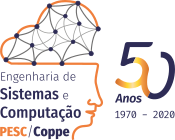Autômatos Celulares Probabilísticos com Aplicações a Sistemas Biológicos
Autores
|
6403 |
2902,163
|
|
|
6404 |
2902,163
|
Informações:
Publicações do PESC
Sistemas biológicos são complexos e sua compreensão requer o entendimento das interações entre os componentes individuais e das propriedades emergentes. Esses sistemas são altamente adaptativos, dinâmicos e evoluem ao longo do tempo por meio do processamento da informação. O objetivo deste trabalho é identificar modelos que possam ser aplicados a sistemas biológicos. Em especial, foram considerados autômatos celulares binários unidimensionais e regras elementares. Na evolução do autômato foi introduzida incerteza no nível celular, de forma que cada célula tem a possibilidade de desobedecer a regra em uso e alterar seu estado de forma distinta daquela determinada pela regra. A análise dos resultados sugere que, ao tentar reduzir a incerteza que emerge das interações, os componentes do sistema geram informação e, muitas vezes, há informação adicional criada pela forma como eles interagem entre si. Esses resultados podem ser utilizados, metaforicamente, na representação de processos biológicos complexos, tais como a resposta imune (sistema imunitário) e o aparecimento de estados conscientes (sistema neuronal).
Biological systems are complex and their comprehension requires understanding the interactions between the individual components as well as emergent properties. Such systems are highly adaptive, dynamical, and evolve in time by processing information. The goal of the present work is to identify models that can be applied to biological systems. In particular, we have considered binary one-dimensional cellular automata under elementary rules, and have introduced a probability parameter aimed to alter an automaton's evolution in time in such a way as to allow each cell to occasionally disobey the rule in use. The results obtained suggest that, while trying to reduce the uncertainty that emerges from the interactions between cells, the system's components generate information, often giving rise to the appearance of surplus information resulting from the manner of their interactions. They also suggest the metaphorical use of cellular automata in the representation of complex biological processes, such as the immune response (by the immune system) and the rise of conscious states (in the neuronal system).




